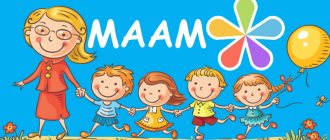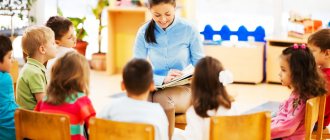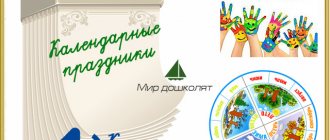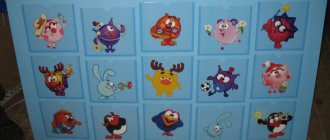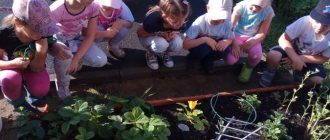Hello dear blog readers, Tatyana Sukhikh is with you and today we will talk about one of the social networks for educators and teachers. The upcoming journey will prompt many of you to create your own website for work.
Today is the time when every teacher should have his own page on the Internet. What is it for? - you ask. I will answer. This page will help the teacher share his work experience. By distributing it in the media, you meet other teachers and exchange experiences. You can improve your qualification level through distance learning courses. And publish materials directly on your page and receive a certificate of dissemination of teaching experience.
So, let's get acquainted with one of the many social networks for educators.
By going to the page you will find a lot of useful information for educators, teachers, methodologists, music directors, physical education instructors, etc.
Registration of a personal account
To create websites and study materials, you will need to gain access to the official resource. You will need to follow a few simple steps:
- Go to the official portal https://nsportal.ru/ and select the “Login/Registration” section on the side. Next in the new “Registration” form.
- Fill out the profile of the future user. Enter your username and email to pass bot protection. Click “Registration”.
Afterwards, it is necessary to activate your personal profile to be able to fully use the functionality. To do this, you will need to follow the link that will be sent to the specified e-mail. Login to your personal account
Directory of preschool education websites
Route map
Regulations
- Federal state requirements for the structure of the basic general education program of preschool education https://www.edu.ru/db/mo/Data/d_09/prm655-1.htm
- Federal State Educational Standard for Preschool Education https://gdou33petergof.narod.ru/info/proekt.pdf
- Professional standard for a teacher https://xn--80abucjiibhv9a.xn--p1ai/%D0%B4%D0%BE%D0%BA%D1%83%D0%BC%D0%B5%D0%BD%D1%82% D1%8B/3071
- Order of the Ministry of Health and Social Development of the Russian Federation (Ministry of Health and Social Development of Russia) dated August 26, 2010 N 761n Moscow “On approval of the Unified Qualification Directory of positions of managers, specialists and employees. Section “Qualification characteristics of positions of education workers” https://www.rg.ru/2010/10/20/teacher-dok.html
- Resolution of the Chief State Sanitary Doctor of the Russian Federation dated May 15, 2013 N 26, Moscow “On approval of Sanitary PiN 2.4.1.3049-13 “Sanitary and epidemiological requirements for the design, maintenance and organization of the operating mode of preschool educational organizations” https://www .rg.ru/2013/07/19/sanpin-dok.html
Official portals
- Federal portal “Russian Education” https://edu.ru/
- Academy for Advanced Training and Professional Retraining of Education Workers - https://www.apkpro.ru
- Educational portal “Study” section Preschool education
- Federal Center for Information and Educational Resources. https://fcior.edu.ru/
- A unified collection of digital educational resources. https://school-collection.edu.ru/
- Information system “Single window of access to educational resources” https://window.edu.ru/
- Open class. Network educational communities. Preschool education. https://www.openclass.ru/node/24346/. This community https://www.ucheba.com/met_rus/k_doshvosp/title_main.htm
- The Education Manager website is a portal of information support for heads of educational institutions - https://menobr.ru/ aimed at solving the problems of preschool education.
- New SanPin 2013 https://www.rg.ru/2013/07/19/sanpin-dok.html
Among electronic educational services only electronic libraries, encyclopedias, dictionaries, reference books can be offered:
- Electronic libraries on the federal portal Russian Education (collection of links) https://www.edu.ru/db/portal/sites/elib/e-lib.htm
- Libraries and encyclopedias online (collection of links) https://offsites.narod.ru/biblio.html
- Dictionaries, encyclopedias, online reference books (collection of links) https://www.nlr.ru/res/inv/ic_old/sprav.htm
- Scientific and Pedagogical Library named after. K.D. Ushinsky https://www.gnpbu.ru/
- Library of Maxim Moshkov https://www.kulichki.com/moshkow/
- Biblius https://www.biblus.ru/
- Scientific electronic library https://elibrary.ru/defaultx.asp
- Omsk State Regional Scientific Library named after. A.S. Pushkin https://www.lib.okno.ru/
- Russian State Library https://www.rsl.ru/
- Russian National Library St. Petersburg https://www.nlr.ru:8101/
- Electronic Library Gumer (humanities) https://www.gumer.info/
Websites for improving ICT competence of teachers
- We analyze the Internet https://www.razbiraeminternet.ru/teacher. The methodological manual is recommended by the Federal Institute for Educational Development.
- “Understandable Internet” https://computer.minsocium.ru/. Training older users in the basics of working with computers and the Internet.
- “Understandable Internet” https://zaprosto-internet.ru/. The Easy Internet contains nine chapters and a dictionary to help your computer become your good friend. The textbook will be useful for older people who study computers and the Internet on their own or in special courses. It will also be useful for more advanced users to teach relatives and friends.
- “Interactivity” https://sites.google.com/site/badanovweb2/home. WEB services for education
- Community “Learning with Google” https://plus.google.com/u/0/communities/102573187983350225011
Electronic periodicals and electronic publications. This group includes websites of periodicals and publishing houses dedicated to the topic of preschool education. These sites are well developed and filled with materials.
- Newspaper "Preschool Education" https://dob.1september.ru/ the site contains the full contents of the issues of the newspaper "Preschool Education". And this is a wide range of educational, educational and developmental materials for parents and educators.
- “Fairy Tales for Children” is a section of the electronic version of the magazine “Koster” dedicated to fairy tales. The site contains a complete collection of children's fairy tales: Russian folk, Swedish, classic fairy tales by Russian and foreign authors. https://www.kostyor.ru/
- Librarian website. An example of the most complete electronic album: “The Life and Work of Great Artists.” Reproductions of any paintings by any authors. Full story about the painting and biography of the author. https://www.bibliotekar.ru/al/
- Magazine "Hoop". Illustrated scientifically popular magazine for managers at all levels, methodologists, kindergarten teachers, primary school teachers and parents https://www.obruch.ru/index.php?id=8&n=7&r=8&s=25
- Magazine "Preschool Education" https://dovosp.ru/about_do
- Magazine for managers and methodologists “Preschool Education Management” - https://www.udou.ru
- Educational portal. Electronic journal Externat.RF. — https://ext.spb.ru/
- Preschool pedagogy - https://www.detstvo-press.ru/.
- Magazine "Directory of a senior teacher of a preschool institution" - https://vospitatel.resobr.ru/.
- Journal "Modern Preschool Education" - https://www.sdo-journal.ru /.
- Information portal “Kindergartens - reviews from parents” - https://www.det-sad.com
Websites directly dedicated to the work of a teacher contain a lot of useful information and useful developments that a teacher can use in his work:
- The “Teacher Portal” website in the Preschool Education tab contains a large collection of ready-made presentations for Kindergarten teachers in various areas, notes on educational activities, holiday scenarios and much more. uchportal.ru
- The website “Festival of Pedagogical Ideas Open Lesson” https://festival.1september.ru/ in the section Working with preschoolers contains a large selection of practical materials that will help the teacher in practical activities.
- Website "Preschooler". This site is very informative. These include ready-made presentations, a collection of poems, a collection of games, recommendations for handicrafts with preschoolers and much more. https://doshkolnik.ru
- Information portal Doshkolenok.ru is a portal for educators and teachers. https://dohcolonoc.ru/. GCD notes, Consultations, Holidays, quizzes, entertainment, work with parents, Physical education in kindergarten, Master classes, Reports, teaching councils, methodological associations in preschool educational institutions, Club work in kindergarten, Experimental activities in preschool educational institutions and much, much more.
- Social network of educators 121,906 user mini-sites have been created on the network and 531,088 educational materials have been collected
- Website “Mom” maaam.ru Educational materials for kindergarten: games and lesson notes, holiday scripts and crafts. For educators: notes on studies and early development in kindergartens, innovative methodological developments, collections of holiday scenarios for children, original children's crafts, educational games for preschoolers, unusual design examples, wall newspapers and presentations. Materials are regularly added and replenished.
- Website “Education of preschool children in kindergarten and family” https://doshvozrast.ru/ website sections: Work with parents, Health work, Legal education, Play activities, Parents of preschool children, Books on preschool education, etc.
- The site “Pochemuchka” https://pochemu4ka.ru/ contains poems, stories, fairy tales for children, nursery rhymes, finger games, coloring books, audio tales, online games for children and more.
- Website "KINDERGARTEN" https://detsad-kitty.ru/ website for children and adults. Contains a large number of folders, templates, pictures, coloring pages, cartoons, teaching aids, holiday scripts, music for children and much more.
- The children's portal “Sun” https://www.solnet.ee/ contains a large selection of materials for working with children. These include all kinds of crafts, coloring books, children's magazines, etc.
- Early development of children. Information portal for caring parents https://www.danilova.ru/
- Before and after three https://azps.ru/baby/ - a site dedicated to preschool development, especially early development.
- Everything for kindergarten https://ivalex.vistcom.ru/ - the site contains materials to help managers and teachers of preschool educational institutions.
- Educational portal “Methodology” section Preschool education https://www.ucheba.com/met_rus/k_doshvosp/title_main.htm
- The website Educator - https://vospitatel.com.ua/ - contains notes on kindergarten classes, methods, various information for teachers and parents, as well as various developmental activities for children.
- Preschoolers https://doshkolniky.ru/
- Doshkolniki.org - https://doshkolniki.org/ - preschool education and training, preschool psychology and pedagogy.
- Preschoolers - https://www.doshkolyata.com.ua - author's website about raising children from birth to seven years old
- About childhood (portal for children, parents, teachers) - https://www.o-detstve.ru/
- Presentations, educational games https://detsadd.narod.ru/
- Early childhood development (site for children's presentations) https://www.danilova.ru/storage/present.htm
- “Child Psychologist” - https://www.childpsy.ru
- Speech therapist - https://www.logoped.ru
- Methodological work in kindergarten - https://kuzminaalena.blogspot.ru
Electronic didactic materials
- https://razigrushki.ru - “RazIgrushki” is a site for children and their parents who care about the harmonious development and upbringing of their children.
- https://www.baby-news.net – “Baby news” – A huge amount of educational materials for children, the site will be of interest to both parents and children.
- https://packpacku.com - children's coloring books, online coloring books, coloring books with numbers, pictures with numbers, children's labyrinths, skillful hands, educational children's online games, free online games for boys and girls and much more for your child.
- https://www.zonar.info - "Origami - World with your own hands." The site is dedicated to the ancient art of folding paper figures. Here you will find diagrams and videos of origami folding schemes.
- https://www.lukoshko.net/ - Lukoshko of fairy tales. The site offers fairy tales, poems and stories for children. Here you can find Russian folk tales and tales of other nations, stories about animals, poems and songs for children.
- https://www.raskraska.ru/ - Coloring book. Internet studio of Alexander Babushkin. Here you can find any picture for your child to color and print it in black and white so that the child can color the selected picture. All coloring pages are provided free of charge.
- https://wunderkinder.narod.ru/ - Wunderkinder. The website contains materials necessary for the education and development of children. The materials are presented in the form of computer presentations (slides) that can be printed on paper, as well as entertaining Flash cartoons and games. Materials on the Russian language, mathematics, reading, studying the surrounding world, biology, history, and drawing are intended for teaching children at home, in kindergarten, and in elementary school.
For children
- 1001 fairy tales - https://1001skazka.com
- children in the middle of nowhere, online games, music lessons - https://children.kulichki.net/
- “Read-ka”, children's fairy tale magazine - https://www.cofe-ru/read-ka/
- games - https://www.detochka.ru
- children's world: riddles, songs, cartoons, baby animals - https://www.skazochki.narod.ru
- children's "playroom": songs, poems, games - https://www.playroom.com.ru
- children's entertainment website "Teremok" - https://www.teremoc.ru
- children's website "All about cartoons" - https://www.myltik.ru
- electronic fairy tales - https://www.e-skazki.narod.ru
- electronic educational resources - https://eor-np.ru/taxonomy/term/548
- 900 children's presentations - https://900igr.net/
- Cats and Mouse (children's entertainment and educational website) - https://koshki-mishki.ru/
- Children's website "Pustunchik" - https://pustanchik.ua/
- Eaglets - children's portal (educational games, fairy tales, cartoons) - https://www.orljata.ru/
- Find out (Learning together - Learning while playing) - https://www.poznayka.ru/
- BABY-NEWS (Educational material for children) - https://baby-news.net/
For parents:
- https://www.kindereducation.com - “Preschooler.”
- Creation of talents https://talant.spb.ru - society for early childhood education..
- https://wunderkinder.narod.ru/ - the site presents materials necessary for the education and development of children..
- https://tbsem.narod2.ru/ - a site for parents, contains articles about the health of the child, his development and upbringing
- All about children and family https://7ya.ru/
- Portal for parents “Our Children” https://www.nachideti.ru/
- Umniki.21 (site for children and their parents) - https://www.umniki21.ru/ - the site presents versatile educational exercises for preschool children.
Competition sites
- The All-Russian Ranking of School Websites is an updated database of websites of educational institutions, ranked in accordance with independent expert assessments. The founders of the rating are the Russian New University, OJSC Prosveshchenie Publishing House, and the National Research University Higher School of Economics (HSE) https://rating.rosnou.ru/?q=about
- All-Russian portal “Runet Pedagogical Rating” ratingruneta.rf, which organizes website competitions for educational institutions. https://xn--80affbnf3abvfsgk.xn--p1ai/2tur
Competitors:
Kindergarten No. 452 “Spring” of N. Novgorod https://rodnik452.caduk.ru/ tutor Smetanina E.A.
Municipal preschool educational institution kindergarten of general developmental type No. 2 “Bell” https://dou2kolokolchik.narod.ru/
Municipal preschool educational institution compensatory kindergarten No. 13 “Buratino”, Volzhsk RME https://dou13buratino.narod.ru/
- Page of the Internet competition for “Best website of a preschool educational institution: https://vospitatel-goda.ru/DOU_contest/
In the category “Best preschool educational institution website” the winner was recognized as MBDOU DS combined type No. 11 “Berezka” in the city of Pyatigorsk, Stavropol Territory Website address: www.berezka11.ru
In the category “Designer Find” - for the non-standard, original and colorful design of the website - the winner was MBDOU No. 152 - a combined kindergarten, Tula city, Kosaya Gora village Website address: https://detsad152.uotula.ru/
Access recovery
Sometimes registered users lose their personal account login information, but this is not a big deal. The portal provides a password renewal service. To use it, do:
- visit the authorization page https://nsportal.ru/user;
- click “Forgot your password?”;
- indicate your username or email;
- confirm that the person is not a bot;
- Click “Send password by e-mail.”
You will receive the login details for your Nsportal personal account via your email address.
LC functionality
Nsportal personal account is a convenient option for interaction between two parties. LC opens up opportunities:
- creation of a mini-site;
- reading answers to frequently asked questions;
- visiting a forum to communicate with like-minded people;
- viewing ready-made websites for classes and educational institutions;
- viewing thematic collections of materials;
- library study;
- reading the latest comments;
- familiarization with site groups;
- studying pedagogical ideas and findings;
- studying the rules for certification of teachers;
- obtaining certificates of publication;
- viewing audio and video recordings;
- reading the latest news, etc.
The portal allows you to submit an application for a certificate and a certificate of website creation, which is sent to the Russian Post. A full range of services is offered. Your Nsportal personal profile is available at any time of the day.
What exactly will you find on the central page?
On the top line of the site
Features overview - here you will find a sample mini-site
Virtual University
Project for gifted children “Scarlet Sails”
In addition, I recommend looking through the pages below, where you will find even more information about the site:
- Kindergarten
- Primary School
- School
- University
- Education in general
- Education in the regions
- Hobbies
Site's home page
Laboratory of Humane Pedagogy
Laboratory of pedagogical excellence
Group discussions
Forum topics
Blog Articles
Materials
In the website bar on the right you will be pleasantly surprised:
Site news
Quotes of the day
Our competitions (held on the website)
Courses (which you can complete and receive a certificate or certification)
Groups (which you can join and share your work)
Participate in a site survey
Watch videos
Audio recordings
In the website bar on the left you will see
Join us
By registering, you can: Create your own personal mini-site. Post your portfolio on the mini-site and receive a Certificate of publication in electronic media.
Certificate of creation of a personal website.
Create websites for educational institutions.
Build your social circle in interest groups (communities).
Develop original training courses at a virtual university.
Every year, grants are distributed among the best courses.
Features overview:
- Login/Registration is exactly what interests us and what we will do in the next post: "How to register on the social network "Our Network"
- Then you can see: Site navigation, favorites, library and project news
We got acquainted with the social networking site for educational workers “Our Network”, scrolled through all the pages and have an idea about your future mini-site. The most important thing for us is to register on the website for teachers, create your own page and fill it with information about you.
The next article is about how to register on the social network “Our Network” with a step-by-step video, so as not to miss, subscribe to blog updates and you will always be aware of all subsequent additions.
Tatyana Sukhikh was with you, all the best, see you in the next article.
Similar articles:
Mobile app
To date, Nsportal has not created an application for a rich phone that would facilitate collaboration. But clients are satisfied with the portal and expressed gratitude to the administration. Therefore, this issue is already under consideration.
But any registered user will be able to log into their Nsportal personal account in any case, since the official resource is equipped with the appropriate version. It is identical to the computer one, and offers the same functions, navigation, design, etc. Select a convenient browser, enter the portal address in the search and go to it. Login is carried out according to the available data. There is no need to register again. To enter, you can use not only a smartphone, but also other devices.
Contacts
Sometimes people have both questions and difficulties of any nature. They may relate to both logging into the portal and using functions. In any situation, you can contact Nsportal by writing a message to the administration. Organization email – [email protected]
In the letter, correctly state the reason for the application and, if necessary, attach files and documents. This will help speed up the review process, as well as get a more detailed and detailed answer. Feedback is sent to the original email. Replies usually come within 24 hours.
MAGAZINE Preschooler.RF
A unified environment (community) for interaction between preschool education workers: a new modelThe modern system of preschool education is characterized by a targeted focus on the harmonious development of the child. In accordance with this, preschool education should be a flexible and variable system that implements the state educational order and meets the needs of consumers of educational services (namely, preschoolers and their parents). One of the main components of this system is effective training and constant professional and creative growth and development of educators. This is of particular relevance in connection with the introduction of the Federal State Educational Standard for Preschool Education (hereinafter referred to as the Federal State Educational Standard for Preschool Education) into the work of Russian kindergartens.
One of the priority models that ensures the training, professional growth and development of educators to meet high standards of professional work supported at the state level is the creation and development of network professional communities. Today, practically such communities have been created in almost all regions of our country. Examples are all-Russian associations (“Methodists”, “Social Network of Education Workers”, “Network of Creative Teachers”, “Education Resources”, etc.), and large regional communities (network community of preschool teachers of the Kamchatka Territory “Kolobok”, Association of Teachers of Preschool Educational Organizations of the Moscow Region, Community of Preschool Teachers “Our Bee” of the Vladimir Region and others), and city associations, and even communities created on the basis of a separate kindergarten. However, when analyzing their activities, the authors of the article identified the following problems that hinder their further development and effectiveness, namely:
- a number of communities do not have websites on the Internet;
- lack of interaction between associations of different levels and profiles;
- membership in the professional community is superficial, there are no benefits and advantages, both materially and socially and professionally (participation in competitions, organization of exhibitions, methodological publications, etc.);
- lack of interaction between professional communities and educational authorities, scientific sites, public organizations, parents;
- lack of communities aimed at uniting employees of private kindergartens and centers.
Thus, it is urgent to create a single professional association that would allow solving the problems arising from the above problems. The model of the created network community should become a platform for representing the interests of the educational space of specialists involved in the field of preschool education (teachers, educators, methodologists, psychologists, psychophysiologists, preschool directors), together with interested parties (parents, representatives of the public), and pursue purely practical goals . The model of a network professional community of preschool education workers developed by ANO “Status” at the request of the Russian Ministry of Education and Science is aimed at creating an All-Russian Association of Professional Network Communities of Participants in the Preschool Education System (hereinafter referred to as the Association). The key direction of this model is the creation of an association of regional and municipal network communities that open up fundamentally different opportunities for education, communication and have serious pedagogical potential in state and public administration. The main approach is that today there are many fairly strong professional communities of preschool education workers in the country. The approach is based on the following proposition: it is inappropriate to oppose existing communities with something new, or to create competition in this environment. The main goal is to integrate existing communities of various levels into a single structure, which will be reflected both in network interaction (based on a specialized electronic resource) and in face-to-face participation, securing the status of a member of this association, which provides certain benefits and advantages. The association will be aimed at achieving the following goals:
- stimulating the diversity of municipal and regional professional network communities with their specificity and flavor, but under uniform operating standards;
- creation of effective tools for professional growth, development of special competencies among all specialists involved in the field of preschool education;
- involving parents and the general public in the process of managing preschool education (state-public management);
- ensuring public assessment of the quality of work and professionalism of kindergarten teaching staff (rating system, evaluation of methodological developments and experience of teachers and directors, etc.);
- support and discussion by participants of new educational initiatives at the all-Russian level;
- development and provision of a package of benefits aimed at social protection of Association members.
The members of the Association will be:
- managers and employees of preschool educational organizations;
- parents and other family members of preschool children;
- lawyers in the field of educational law (they can provide advice to other participants on issues of protection of rights, educational, labor legislation. They can also participate in the examination of draft laws and other regulatory documents);
- representatives of various non-profit organizations in the field of motherhood and childhood;
- representatives of the non-state sector of preschool education, incl. a separate category - young businessmen starting their own business in the preschool education services sector;
- specialists from state and public education management bodies;
- specialists from scientific, experimental, and internship sites in the field of preschool education;
Since the Association is, in fact, a community of communities, the participants must also be the responsible persons (coordinators) of the municipal or regional professional community, which will represent the interests of the network association in the coordinating council of the Association, as well as broadcast important information on the portal of the network community. Tutors (experts) also participate in the Association - they provide consultations to municipal and regional communities using the functionality of the online community portal. Representatives of the federal center for distance learning, resource center, as well as representatives of publishing houses, scientific organizations, interested commercial organizations and foundations that provide support for one or another innovative form presented on the community portal are also invited to participate in the Association. The last, no less significant category of participants are representatives of trade unions of teachers of preschool educational organizations. The breadth of the above goals and the diversity of participants who will be involved in the community dictate the need to create a single information field that would ensure this interaction at the most effective and modern level. Such an information field is a professional network community - an information resource that will support the activities of the Association. In the information environment of the Association, there are three hierarchical levels of interaction: strategic, tactical and operational. At the strategic level, professional communities (regional or municipal) set the tone for interaction. It is advisable to introduce a governing (coordinating) body of the Association, representatives to which are elected from each of the professional communities included in the association from regions and municipalities (Coordination Council) with the development of appropriate regulatory support. At the tactical level, the main task is performed by the tutors (or experts) of the Association. Their task is to provide organizational and pedagogical support for the professional activities of educators, methodologists, and managers in preschool educational institutions. Tutors determine the set of information necessary for organizational and pedagogical support of kindergarten teachers and methodologists, create a knowledge base on programs for training, education and development of preschool children, as well as changes in legislation at the federal level. They provide methodological and advisory support for the work of the community itself. The mechanism for selecting tutors can be based, among other things, on the rating assessment of community members (their level of competence, their practical experience, the effectiveness and innovativeness of their pedagogical developments). Those participants who get the highest ratings become tutors. And, finally, the operational level - where the main ones are the educators themselves, kindergarten methodologists, parents, executive authorities, non-profit organizations and foundations and other categories of participants. Representatives of this level work with the information presented in the system, exchange experience, take distance learning courses, evaluate programs and methods of working with preschoolers, the developments of other participants, and take an active part in the formation of proposals to improve the quality of the preschool education system. It is advisable to determine the following principles on which the work of the Association will be based: The principle of voluntariness and independence of its members (municipal and regional professional network communities). The online community is semi-closed, that is, joining it is limited by certain conditions, a registration procedure that encourages a new member of the community to take on a social role characteristic of this network. The principle of openness of actions, results, problems, information. In accordance with this principle, the online community has a diversified communication structure, which includes personal contacts in different formats. The principle of mutual trust among participants in the online community. Principle of interaction. The online community allows you to obtain additional benefits through the cooperation of participants to solve specific problems. In accordance with the principle of interaction, there is a process of exchange between participants in the network community of published teaching materials, results of innovative activities, participation in solving problems, conducting public examination at the federal level, the principle of respect for intellectual property. The principle of compliance with ethical standards and rules of interaction. But the main principle of the Association’s work, in fact, should be the activity of its participants. There are a lot of professional communities where participants are simply “readers” waiting for new information messages, but their effectiveness for the participants themselves is low. When implementing the proposed model of a professional community of preschool education workers, one must strive to ensure that the participants are subjects of decision-making and decision-making.
| Next > |
